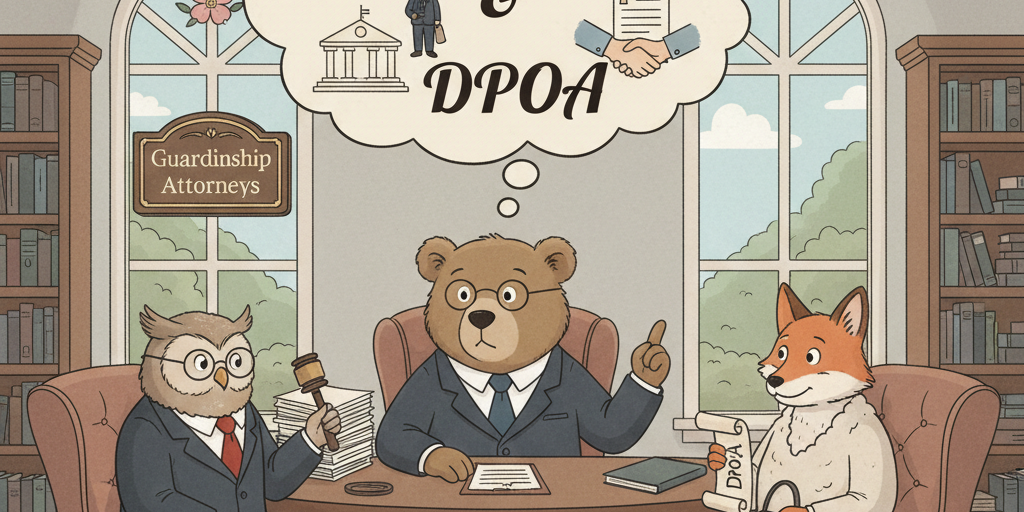What is the difference between guardianship and a durable power of attorney for managing my mother’s finances? – North Carolina
Short Answer
In North Carolina, a durable power of attorney (DPOA) is a private document an adult signs while they still have capacity, giving an agent authority to manage finances. Guardianship is a court process where the Clerk of Superior Court appoints a guardian (often “guardian of the estate”) after the person is adjudicated incompetent. If your mother never signed a valid DPOA and now lacks capacity, you cannot create one now; you will likely need to pursue guardianship to manage her finances.
Understanding the Problem
You need to decide whether, in North Carolina, you can rely on a durable power of attorney or must seek a court-appointed guardian to manage a parent’s money. Here, your mother suffered a stroke and never regained capacity. As adult children, you want legal authority to pay her bills and protect her limited funds. The central question is: can you use a DPOA now, or must you file for guardianship with the Clerk of Superior Court?
Apply the Law
Under North Carolina law, a DPOA works only if the principal had capacity when signing. After incapacity, no one can sign a new DPOA for them. Guardianship requires a formal adjudication of incompetence and, if proven, the Clerk may appoint a guardian of the estate to handle finances. North Carolina favors the least restrictive option, so if a valid, sufficient DPOA exists and works, the court may not impose guardianship. If a guardian is appointed, the agent under any existing DPOA becomes accountable to the guardian, and the guardian can revoke or amend the DPOA if needed.
Key Requirements
- Capacity for DPOA: The principal must have legal capacity at the time of signing; no retroactive fix is available.
- Least restrictive alternative: Guardianship is a last resort; use an existing, adequate DPOA if it meets the person’s needs.
- Adjudication first: The Clerk of Superior Court must find the person incompetent before appointing a guardian.
- Guardian of the estate duties: Post bond, take control of assets, file an inventory within three months, and submit periodic accounts.
- Interaction with an existing DPOA: An appointed guardian can oversee, amend, or revoke a DPOA; the agent owes duties to the guardian and principal.
What the Statutes Say
- North Carolina Gen. Stat. § 35A-1201 (Purpose of guardianship) – Guardianship for adults is a last resort after less restrictive alternatives are considered.
- North Carolina Gen. Stat. § 35A-1105 (Petition to adjudicate incompetence) – Starts the incompetency case before the Clerk of Superior Court.
- North Carolina Gen. Stat. § 35A-1251 (Guardian of the estate powers) – Lists broad powers to manage, preserve, and use the ward’s property.
- North Carolina Gen. Stat. § 32C-1-108 (Nomination; relation to guardian) – Addresses how a court-appointed guardian relates to an agent under a DPOA.
Analysis
Apply the Rule to the Facts: Because your mother never regained capacity, she cannot sign a DPOA now. If she previously signed a valid DPOA that grants enough financial powers, you can often act under it without a guardianship. If no DPOA exists, or it is too limited or being misused, you will likely need to seek a guardianship of the estate so a court‑appointed guardian can lawfully manage her accounts and pay her expenses under court oversight.
Process & Timing
- Who files: Any interested person (often an adult child). Where: Clerk of Superior Court in the North Carolina county where your mother resides. What: File AOC‑SP‑200 (Petition for Adjudication of Incompetence and Application for Guardianship) with supporting medical information. When: File as soon as you confirm no adequate DPOA exists; the hearing is typically set within weeks, but timing varies by county.
- Before the hearing, the sheriff serves your mother; the Clerk may appoint a guardian ad litem. At the hearing, the Clerk decides incompetence and, if appropriate, appoints a guardian of the estate. A bond is usually required before you receive Letters of Guardianship.
- After appointment, the guardian secures and manages funds, files an inventory within three months, and submits annual accountings. Expect Letters of Guardianship as the controlling document you present to banks and others.
Exceptions & Pitfalls
- If a valid, comprehensive DPOA already exists and meets current needs, the court may decline guardianship as too restrictive.
- You cannot create a DPOA for someone who currently lacks capacity.
- Guardians must post bond; delays can occur if bonding is not arranged promptly.
- Selling real property or making large transfers usually requires specific court approval; plan for extra steps.
- Family disputes can lead the Clerk to appoint a neutral third party as guardian to avoid conflicts.
- Service and notice errors can delay the hearing; confirm addresses and required notices early.
Conclusion
In North Carolina, use a durable power of attorney if it was validly signed while your mother had capacity and it provides enough financial authority. If no adequate DPOA exists and she now lacks capacity, guardianship—specifically, a guardian of the estate—is the path to gain legal control of her finances. Next step: file AOC‑SP‑200 with the Clerk of Superior Court where she resides; if appointed, file the inventory within three months.
Talk to a Guardianship Attorney
If you’re dealing with whether to use a power of attorney or pursue guardianship to manage a parent’s finances, our firm has experienced attorneys who can help you understand your options and timelines. Call us today at [919-341-7055].
Disclaimer: This article provides general information about North Carolina law based on the single question stated above. It is not legal advice for your specific situation and does not create an attorney-client relationship. Laws, procedures, and local practice can change and may vary by county. If you have a deadline, act promptly and speak with a licensed North Carolina attorney.


